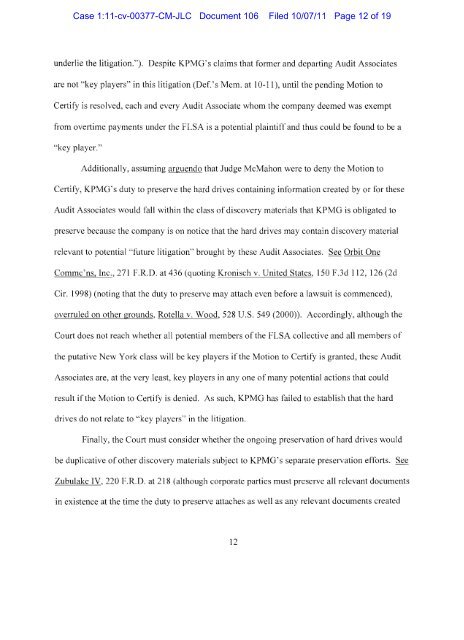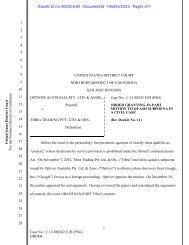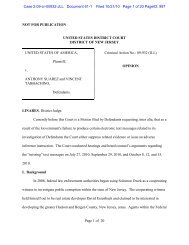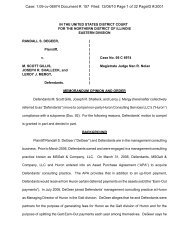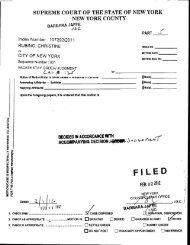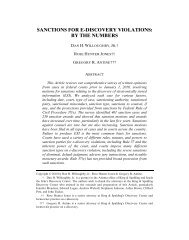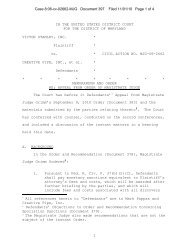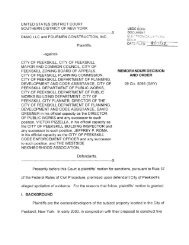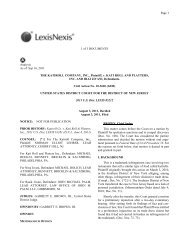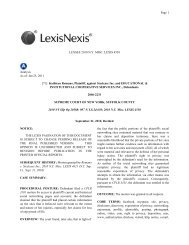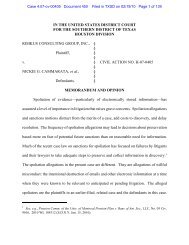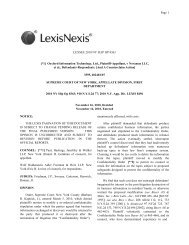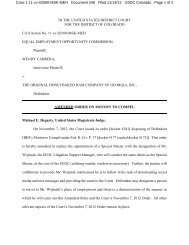Pippins v. KPMG, No. 11-377 - E-Discovery Law Alert
Pippins v. KPMG, No. 11-377 - E-Discovery Law Alert
Pippins v. KPMG, No. 11-377 - E-Discovery Law Alert
Create successful ePaper yourself
Turn your PDF publications into a flip-book with our unique Google optimized e-Paper software.
Case 1:<strong>11</strong>-cv-00<strong>377</strong>-CM-JLC Document 106 Filed 10/07/<strong>11</strong> Page 12 of 19<br />
underlie the litigation."). Despite <strong>KPMG</strong>'s claims that former and departing Audit Associates<br />
are not "key players" in this litigation (Def.' s Mem. at 10-<strong>11</strong>), until the pending Motion to<br />
Certify is resolved, each and every Audit Associate whom the company deemed was exempt<br />
from overtime payments under the FLSA is a potential plaintitI and thus could be found to be a<br />
"key player."<br />
Additionally, assuming arguendo that Judge McMahon were to deny the Motion to<br />
Certify, <strong>KPMG</strong>'s duty to preserve the hard drives containing information created by or for these<br />
Audit Associates would fall within the class of discovery materials that <strong>KPMG</strong> is obligated to<br />
preserve because the company is on notice that the hard drives may contain discovery material<br />
relevant to potential "future litigation" brought by these Audit Associates.<br />
Orbit One<br />
Commc'ns, Inc., 271 F.R.D. at 436 (quoting Kronisch v. United States, 150 F.3d <strong>11</strong>2, 126 (2d<br />
Cir. 1998) (noting that the duty to preserve may attach even before a lawsuit is commenced),<br />
overruled on other grounds, =-"'==-:~~=, 528 U.S. 549 (2000)). Accordingly, although the<br />
Court does not reach whether all potential members of the FLSA collective and all members of<br />
the putative New York class will be key players if the Motion to Certify is granted, these Audit<br />
Associates are, at the very least, key players in anyone ofmany potential actions that could<br />
result if the Motion to Certify is denied. As such, <strong>KPMG</strong> has failed to establish that the hard<br />
drives do not relate to "key players" in the litigation.<br />
Finally, the Court must consider whether the ongoing preservation of hard drives would<br />
be duplicative of other discovery materials subject to <strong>KPMG</strong>'s separate preservation efforts. See<br />
==="--,,,-,,-,220 F.R.D. at 218 (although corporate parties must preserve all relevant documents<br />
in existence at the time the duty to preserve attaches as well as any relevant documents created<br />
12


